
Southwest England, England
A large protected landscape in Wiltshire, managed for its natural beauty and diverse habitats.
A Dark Sky Reserve in South Wiltshire, recognized for its peaceful rural character and stargazing opportunities.
A local charity managing nature reserves, working to protect habitats and species across the county.
Public recycling bins are less common than general waste bins. Most accommodation will have recycling facilities. Use provided bins and avoid littering, especially on trails. Embrace 'Leave No Trace' principles.
Inquire about recycling options at your hotel, B&B, or holiday cottage. Separate bins for paper, plastic, and glass are common.
Carry a reusable water bottle and a reusable shopping bag to minimize single-use plastic. Tap water in the UK is safe to drink.
Seek accommodation providers that highlight their sustainable practices, like renewable energy or local produce sourcing.
Some tour operators specialize in low-impact or responsible tourism, designing itineraries that minimize environmental footprints. Inquire about their sustainability policies.
These organizations manage historic sites and large areas of land in Wiltshire with a strong focus on conservation.
Your travel choices support Wiltshire's landscapes. Opt for eco-friendly choices and follow conservation practices.
Your travel choices play a role in the destination's cultural preservation.
National Trust and English Heritage actively preserve historic sites and land. Support their efforts through visits or memberships. Many local councils and societies work to protect local heritage.
Ask permission before photographing people. Be discreet during religious ceremonies. Observe local customs and etiquette, using "please" and "thank you."
Salisbury Cathedral: Dress respectfully (shoulders and knees covered is recommended). Keep quiet during services or prayer times. Photography may have restrictions; look for signs.
Avebury/Stonehenge: These are ancient sacred sites. Treat them with reverence. Do not climb on the stones at Avebury or touch the sarsen stones at Stonehenge (typically restricted to special access tours).
Respect privacy, especially in residential areas or where signs request no photography. Avoid intrusive photography. When photographing historic buildings, be aware of people nearby and their right to privacy.
Always ask permission before photographing individuals, notably children, to respect their privacy.
Some museums or religious sites might prohibit flash photography or photography entirely.
Private properties require explicit permission for photography. Observe clear signage.
Thoughtful interactions enrich your travel experience. Respect local customs, traditions, and sacred places.
Your travel choices directly help the local economy.
Directly support local businesses, independent shops, cafes, pubs, and locally owned accommodations. This ensures your money helps the local economy and sustains small enterprises.
Look for products labeled as Fairtrade, ensuring producers receive a fair price. Many farm shops and artisan markets will sell ethically produced goods.
While less prevalent in the UK compared to some global destinations, be aware of purchasing counterfeit goods.
Counterfeit goods often fund illicit activities and do not support genuine local craftsmanship.
If something seems too cheap to be true, it likely is counterfeit.
Support genuine artisans and local businesses. Consider The Rainforest Site (GreaterGood) for ethically sourced products that aid conservation.
Avoid purchasing counterfeit goods to support genuine local craftsmanship and ethical trade practices.
Conscious choices directly help the community. Prioritize independent businesses and ethical practices.